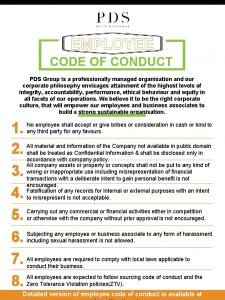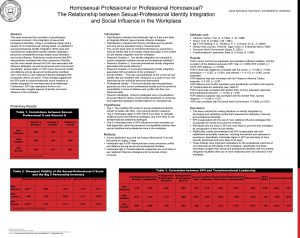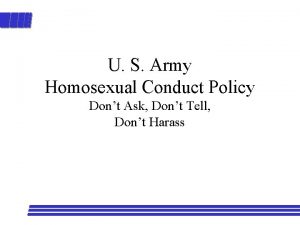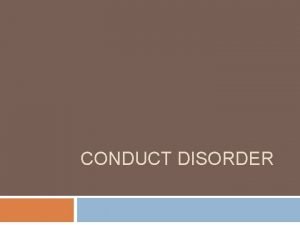Do D Homosexual Conduct Policy Focus of the







- Slides: 7

Do. D Homosexual Conduct Policy • Focus of the policy is Homosexual Conduct, NOT Sexual Orientation • Command will separate soldiers for homosexual: – Statements (e. g. “I am gay”); – Acts; or, – Marriages (actual or attempted) • Note: A soldier who makes a homosexual statement, but who also convinces a separation board that he or she will not engage in homosexual acts, can be retained in the Army 1

Do. D Homosexual Conduct Policy • A soldier who takes any of the following actions violates the homosexual conduct policy and may be discharged from the Army – Makes a homosexual statement – Commits a homosexual act – Enters, or attempts to enter, into a homosexual marriage • A soldier who, for the purpose of avoiding military duty, engages in any of the behaviors listed above may be subject to disciplinary action under the UCMJ 2

Investigating Homosexual Conduct • Only Commanders Initiate Inquiries • An inquiry must be based on Credible Information • Examples of information that is NOT Credible: – Mere suspicion, opinion or rumors – Reading Homosexual Publications/Going to “gay bars” – Homosexual statements made to avoid duty • Conduct the inquiry (informal inquiries preferred): – – Right against self-incrimination (Article 31, UCMJ) Cannot ask soldier about his/her sexual orientation Can question soldier’s supervisory chain-of-command Can question persons suggested by the soldier 3

Investigating Homosexual Conduct • “Substantial investigation” requires DA approval • Statements to chaplains, attorneys and spouses may be considered confidential • You will violate the Policy IF: – You investigate a soldier for homosexual conduct without a commander’s permission; or, – Accuse a soldier of violating the homosexual conduct policy based on: • Suspicion without credible evidence • Rumors • Observing a soldier with homosexual materials or in certain locations (e. g. “gay bars”) 4

Anti-Harassment Policy • A soldier being harassed should seek out the chain-of-command, a chaplain, the IG, or a legal assistance attorney • A harassed or threatened soldier should not be investigated simply because of the harassment or threat • The Do. D Homosexual Conduct Policy does not, however, prohibit investigating a soldier(s) who harasses or threatens another soldier for possible violations of the UCMJ 5

Anti-Harassment Policy • Commanders need credible information other than harassment to investigate a soldier for homosexual conduct. HARASSMENT ALONE IS NOT CREDIBLE INFORMATION. • Absent credible information, an investigation into a complaint of either harassment or of a threat must focus on the harassment or threat, ONLY • Credible information discovered during the course of an investigation does NOT stop the requirement to properly dispose of allegations of harassment 6

Anti-Harassment Policy • The command cannot make harassment stop if it is not reported • Commanders must adequately address reported instances of harassment – The focus of any investigation into alleged harassment must be on the soldier(s) committing the harassment – Harassed or threatened soldiers must know that their own sexual orientation will not be the subject of the investigation – When conducting the investigation, a commander can request the assistance of either MPI or CID 7













